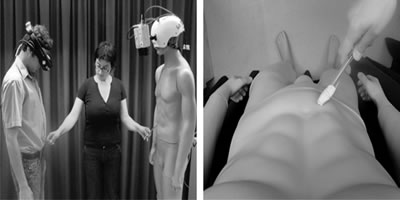Science Fiction
Dictionary
A B C D E F G H I J K L M N O P Q R S T U V W X Y Z
Virtual Body-Swapping Tech

In the 1995 movie Strange Days, people are able to perfectly see what it is like to perceive from another person's body. In a recent study published by Valeria I. Petkova and H. Henrik Ehrsson of the Department of Neuroscience, Karolinska Institutet, Stockholm, Sweden, we start to see how it could work.
By using relatively simple cameras and goggles, it became clear that it is surprisingly easy to manipulate the body into a "body-swapped" experience.

(Experimental set-up to induce illusory ownership of an artificial body)
Here we report a perceptual illusion of body-swapping that addresses directly this issue. Manipulation of the visual perspective, in combination with the receipt of correlated multisensory information from the body was sufficient to trigger the illusion that another person's body or an artificial body was one's own. This effect was so strong that people could experience being in another person's body when facing their own body and shaking hands with it.
In the film, a police detective turned street hustler (Ralph Fiennes) deals in 'SQUID' recordings: experiences recorded directly from the cerebral cortex which when played back through a MiniDisc-like device allow a user to experience all recorded sensory inputs as if actually doing it themselves.
(Strange Days trailer video)
SF fans will also recall SimStim, that "gratuitous multiplication of flesh input", from William Gibson's seminal novel Neuromancer.
From If I Were You: Perceptual Illusion of Body Swapping; thanks and apologies to Moira for how long it took me to put this story up.
Scroll down for more stories in the same category. (Story submitted 12/19/2008)
Follow this kind of news @Technovelgy.| Email | RSS | Blog It | Stumble | del.icio.us | Digg | Reddit |
Would
you like to contribute a story tip?
It's easy:
Get the URL of the story, and the related sf author, and add
it here.
Comment/Join discussion ( 1 )
Related News Stories - (" Culture ")
A Remarkable Coincidence
'There is a philosophical problem of some difficulty here...' - Arthur C. Clarke, 1953.
Is It Time To Forbid Human Driving?
'Heavy penalties... were to be applied to any one found driving manually-controlled machines.' - Bernard Brown, 1934.
Indonesian Clans Battle
'The observation vehicle was of that peculiar variety used in conveying a large number of people across rough terrain.' - Jack Vance (1952)
Liuzhi Process Now In Use In China
'He was in a high-ceilinged windowless cell with walls of glittering white porcelain.' - George Orwell, 1984.
Technovelgy (that's tech-novel-gee!) is devoted to the creative science inventions and ideas of sf authors. Look for the Invention Category that interests you, the Glossary, the Invention Timeline, or see what's New.
Science Fiction
Timeline
1600-1899
1900-1939
1940's 1950's
1960's 1970's
1980's 1990's
2000's 2010's
Current News
The New Habitable Zones Include Asimov's Ribbon Worlds
'...there's a narrow belt where the climate is moderate.'
Can One Robot Do Many Tasks?
'... with the Master-operator all you have to do is push one! A remarkable achievement!'
Atlas Robot Makes Uncomfortable Movements
'Not like me. A T-1000, advanced prototype. A mimetic poly-alloy. Liquid metal.'
Boring Company Drills Asimov's Single Vehicle Tunnels
'It was riddled with holes that were the mouths of tunnels.'
Humanoid Robots Tickle The Ivories
'The massive feet working the pedals, arms and hands flashing and glinting...'
A Remarkable Coincidence
'There is a philosophical problem of some difficulty here...'
Cortex 1 - Today A Warehouse, Tomorrow A Calculator Planet
'There were cubic miles of it, and it glistened like a silvery Christmas tree...'
Perching Ambush Drones
'On the chest of drawers something was perched.'
Leader-Follower Autonomous Vehicle Technology
'Jason had been guiding the caravan of cars as usual...'
Golf Ball Test Robot Wears Them Out
"The robot solemnly hit a ball against the wall, picked it up and teed it, hit it again, over and again...'
Boring Company Vegas Loop Like Asimov Said
'There was a wall ahead... It was riddled with holes that were the mouths of tunnels.'
Rigid Metallic Clothing From Science Fiction To You
'...support the interior human structure against Jupiterís pull.'
Is The Seattle Ultrasonics C-200 A Heinlein Vibroblade?
'It ain't a vibroblade. It's steel. Messy.'
Roborock Saros Z70 Is A Robot Vacuum With An Arm
'Anything larger than a BB shot it picked up and placed in a tray...'
A Beautiful Visualization Of Compact Food
'The German chemists have discovered how to supply the needed elements in compact, undiluted form...'
Bone-Building Drug Evenity Approved
'Compounds devised by the biochemists for the rapid building of bone...'
